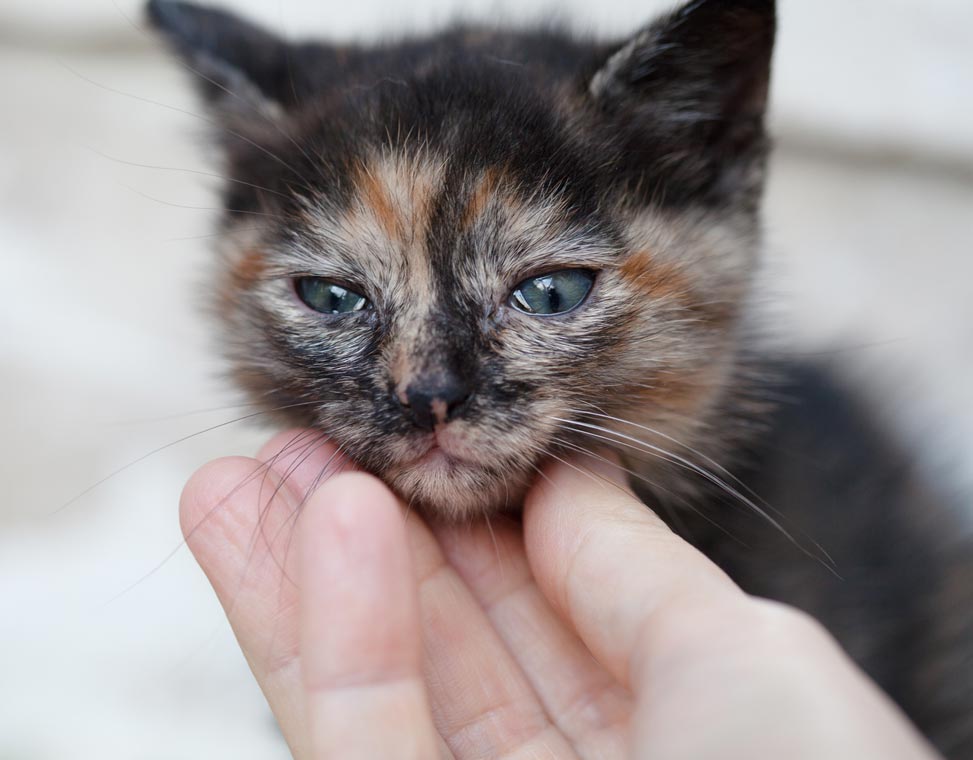Can Cats Get Colds?

When it's cold season, many people spend some time cuddled up on the couch with a blanket, coughing and sneezing. They might wonder if it's safe to cuddle with their cat too or if kitty might catch their cold.
What Causes the Common Cold in People?
Colds in humans are caused by viruses or bacteria that infect the upper respiratory system (the nose, throat, pharynx, and bronchioles of the lungs). Rhinoviruses are the most common viruses that cause colds in people.
When someone has a cold, they often suffer from one or more of the following symptoms:
- Runny nose
- Runny eyes
- Sneezing
- Coughing
- Fever
- Fatigue
Some colds are worse than others, and symptoms usually last around 7-10 days and then get better on their own.
Can Cats Get Colds from People?
Microbes that cause colds are species-specific. That means they only cause symptoms in the species they've adapted to infect. In cats, most upper respiratory infections (colds) are caused by calici- or herpesviruses.
So cats don't catch colds from people (or vice versa), but they do have their own cold viruses and bacteria.
Never give your cat any medications without checking with your veterinarian. You can use a warm, wet cloth to gently clear discharge from the eyes and nose as needed, but many medicines are toxic to cats.
What Are Signs of a Cold in Cats?
Upper respiratory infections (URI) cause many of the same signs in cats as they do in people, including:
- Sneezing
- Coughing
- Lethargy
- Inappetance
- Fever
Some URIs have worse signs than others, and some cats are harder hit by a cold than others. Small kittens, especially, can get severe colds that make them quite sick.
Cats are a little more prone than people or dogs to go off their food when they have a URI because they eat in response to smell. So if they can't smell their food, like when their nose is full of discharge, they aren't likely to eat. In turn, that can quickly lead to dehydration and worsening of the signs of illness.
How Do Indoor Cats Get Colds?
Cats get colds from other cats, so URIs are more commonly seen in those kitties that have recently been around other cats in a kennel, pet store, grooming facility, or veterinary clinic. Still, an indoor cat can get sick when they contact other cats through a screen or when owners unknowingly carry germs in on their clothes or hands.
Do Cat Colds Go Away on Their Own?
Many URIs in cats are self-limiting, which means their bodies fight off the germs and they improve and recover without medical intervention. However, there are times when a cat might need to visit the veterinarian when she has signs of a cold.
- If she doesn't eat for more than a day.
- If she is severely lethargic, not moving around or playing.
- If she's had signs of a URI for more than 10 days with no improvement.
- If she has labored or open-mouthed breathing.
Cats with those signs might need antibiotics or supportive care like fluid therapy or oxygen, or they might have some problem other than a URI.
If your cat is showing signs you think might indicate she has a cold, separate her from other cats, and call your veterinarian for further instructions.
You can learn more here: "Upper Respiratory Tract Conditions in Cats."
You May Also Like These Articles:
Upper Respiratory Tract Conditions in Cats
Cats Snoring: Normal or Abnormal?
Feline Asthma: Lower Airway Disease
Listen to an Adorable Cat with an Equally Adorable Snore: VIDEO
Feline Lower Airway Disease (FLAD)
Cat Scratch Fever: What It Is and How to Avoid It
Skin and Bite Wound Infections
Notice: Ask-a-Vet is an affiliated service for those who wish to speak with a veterinary professional about their pet's specific condition. Initially, a bot will ask questions to determine the general nature of your concern. Then, you will be transferred to a human. There is a charge for the service if you choose to connect to a veterinarian. Ask-a-Vet is not manned by the staff or owners of CatHealth.com, and the advice given should not delay or replace a visit to your veterinarian.






